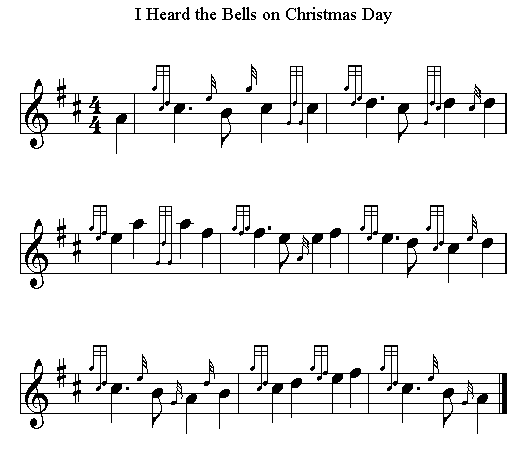 |
||||

Best viewed in
|
I Heard the Bells on Christmas Day "I Heard the Bells on Christmas Day" is based on the 1863 poem "Christmas Bells" by American poet Henry Wadsworth Longfellow. In 1861, two years before writing this poem, Longfellow's personal peace was shaken when his second wife of 18 years, to whom he was very devoted, was fatally burned in an accidental fire. Then in 1863, during the American Civil War, Longfellow's oldest son, Charles Appleton Longfellow, joined the Union Army without his father's blessing. Longfellow was informed by a letter dated March 14, 1863, after Charles had left. "I have tried hard to resist the temptation of going without your leave but I cannot any longer", he wrote. "I feel it to be my first duty to do what I can for my country and I would willingly lay down my life for it if it would be of any good." Charles was soon appointed as a lieutenant but, in November, he was severely wounded in the Battle of New Hope Church, Virginia, during the Mine Run Campaign. Charles eventually recovered, but his time as a soldier was finished. Longfellow wrote the poem on Christmas Day in 1863. "Christmas Bells" was first published in February 1865, in Our Young Folks, a juvenile magazine published by Ticknor and Fields. References to the Civil War are prevalent in some of the verses that are not commonly sung. The refrain "peace on Earth, goodwill to men" is a reference to the King James Version of Luke 2:14. It was not until 1872 that the poem is known to have been set to music. The English organist, John Baptiste Calkin, used the poem in a processional accompanied with a melody "Waltham" that he previously used as early as 1848. The Calkin version of the carol was long the standard. Less commonly, the poem has also been set to Joseph Mainzer's 1845 composition "Mainzer".Since at least the middle of the 20th century, the poem has been set to other musical arrangements, most notably in 1956 by Johnny Marks. The following are the original words of Longfellow's poem: I heard
the bells on Christmas Day
Lyrics
|
|||
